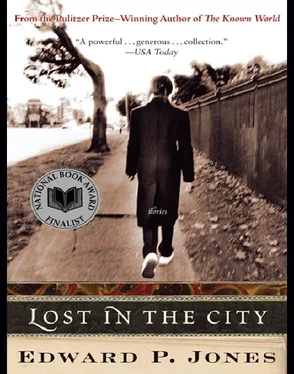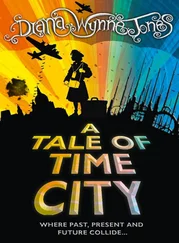She could see him, and slowly the image of him as she knew she would find him took hold. She could see him — asleep in the same chair she had left him in that morning: Perhaps the Sunday newspaper would be scattered at his feet, and maybe the wobbly TV-dinner table would be empty, for he would not want to bring down her wrath by keeping the remains of his dinner in the living room. Perhaps, too, he might have peed on himself again. And the television would be on, as it had been all day, but aside from a football score here and there, he would not be able to remember what he had seen throughout the day. But the wobbly table would not be empty — a few empty beer cans and one that would be half empty, along with his bottles of medicine and a tablespoon with which to take the liquid one.
A few people came and went about her, but the snow now covered the windows of her car and all she could make out were shadows moving about. She could hear voices, but she could not understand any of what people said, as if all sound were being filtered by the snow and turned into garble. She could not anymore read her watch, but she continued to tell herself that in the next minute she would start up the car and go home to Ralph. In the end, it grew cold in the car, and colder still, and at first she did not notice, and then when she did, she thought it was the general condition of the whole world, owing to the snow, and that there was not very much she could do about it.
One day in late October, Woodrow L. Cunningham came home early with his bad heart and found his daughter with the two boys. He was then fifty-two years old, a conscientious deacon at Rising Star AME Zion, a paid-up lifetime member of the NAACP and the Urban League, a twenty-five year member of the Elks. For ten years he had been the chief engineer at the Sheraton Park Hotel, where practically every employee knew his name. For longer than he could recall, his friends and lodge members had been telling him that he was capable of being more than just the number-one maintenance man. But he always told them that he was contented in the job, that it was all he needed, and this was true for the most part. He would be in that same position some thirteen years later, when death happened upon him as he bent down over a hotel bathroom sink, about to do a job a younger engineer claimed he could not handle.
The afternoon he came home early and discovered his daughter with the boys, he found a letter in the mailbox from his father in Georgia. He read the letter while standing in the hall of the apartment building. He expected nothing of importance, as usual, and that was what he found. “Alice took me to Buddy Wilson funeral just last week,” Woodrow read. “I loaned him the shirt they buried him in. And that tie he had on was one that I give him too. I thought I would miss him but I do not miss him very much. Checkers was never Buddy Wilsons game.” As he read, he massaged the area around his heart, an old habit, something he did even when his heart was not giving him trouble. “I hope you and the family can come down before the winter months set in. Company is never the same after winter get here.”
He put the letter back in the envelope, and as he absently looked at the upside-down stamp taped in the vicinity of the corner, the pain in his heart eased. He could picture his father sitting at the kitchen table, writing the letter, occasionally touching the pencil point to his tongue. A new mongrel’s head would be resting across his lap, across thin legs that could still carry the old man five miles down the road and back. Woodrow, feeling better, considered returning to work, but he knew his heart was deceitful. He folded the envelope and stuck it in his back pocket, and out of the pocket it would fall late that night as he prepared for bed after returning from the police station.
Several feet before he reached his apartment door he could hear the boys’ laughter and bits and pieces of their man-child conquer-the-world talk. He could not hear his daughter at first. He stopped at his door and listened for nearly five minutes, and in that time he became so fascinated by what the boys were saying that he would not have cared if someone walking in the hall found him listening. It was only when he heard his daughter’s laughter, familiar, known, that he put his key in the door. She stood just inside the door when he entered, her eyes accusing but her mouth set in a small O of surprise. Beyond her he could see the boys with their legs draped over the arms of the couch and gray smoke above their heads wafting toward the open window.
He asked his daughter, “Why ain’t you in school?”
“They let us out early today,” she said. “The teachers had some kinda meetin.”
He did not listen to her, because he had found that she lived to lie. Woodrow watched the boys as they took their time straightening themselves up, and he knew that their deliberateness was the result of something his daughter had said about him. Without taking his eyes from the boys, he asked his daughter again why she wasn’t in school. When he finally looked at her, he saw that she was holding the stump of a thin cigarette. The smoke he smelled was unfamiliar, and at first he thought that they were smoking very stale cigarettes, or cigarettes that had gotten wet and been dried. He slapped her. “I told you not to smoke in my house,” he said.
She was fifteen, and up until six months or so before, she would have collapsed into the chair, collapsed into a fit of crying. But now she picked up the fallen cigarette from the floor and stamped it out in the ashtray on the tiny table beside the easy chair. Her hand shook, the only reminder of the old days. “We just talkin. We ain’t doin nothin wrong,” she said quietly.
He shouted to the boys, “Get outta my house!” They stood up quickly, and Woodrow could tell that whatever she had told them about him, such anger was not part of it. They looked once at the girl.
“They my guests, Daddy,” she said, sitting in the easy chair and crossing her legs. “I invited em over here.”
Woodrow took two steps to the boy nearest him — the tall light-skinned one he would spot from a bus window a year or so later — and grabbed him with one hand by the jacket collar, shook him until the boy raised his hands as if to protect his face from a blow. The boy’s eyes widened and Woodrow shook him some more. He had been living a black man’s civilized life in Washington and had not felt so coiled and bristled since the days when he worked with wild men in the turpentine camps in Florida. “I ain’t done nothin,” the boy said. The words sounded familiar, similar to those of a wild man ready to slink away into his cabin with his tail between his legs. Woodrow relaxed. “I swear. I don’t want no trouble, Mr. Cunningham.” The boy had no other smell but that peculiar cigarette smoke, and it was a shock to Woodrow that a body with that smell should know something that seemed as personal as his name. The other, smaller boy had tiptoed around Woodrow and was having trouble opening the door. After the small boy had gone out, Woodrow flung the light-skinned boy out behind him. Woodrow locked the door, and the boys stood for several minutes, pounding on the door, mouthing off.
“Why you treat my guests like that?” Elaine Cunningham had not moved from the chair.
“Clean up this mess,” he told her, “and I don’t wanna see one ash when you done.”
She said nothing more, but busied herself tidying the couch cushions. Then Woodrow, after flicking the cushions a few times with his handkerchief, sat in the middle of the couch, and the couch sagged with the familiarity of this weight.
When Elaine had returned the room to what it was, her father said, “I want to know what you was doin in here with them boys.”
Читать дальше












